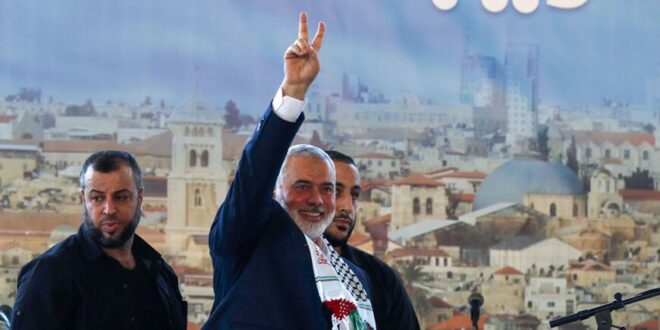The delegation has reportedly discussed efforts to coordinate action against Israel.
As Israel staves off rocket attacks launched from the Gaza Strip and Lebanon’s border in an apparent response to the escalation in Jerusalem’s Al-Aqsa Mosque — Islam’s third holiest site — a Hamas delegation led by the head of the movement’s political bureau, Ismail Haniyeh, arrived in Beirut on Wednesday.
Hamas spokesman in Lebanon Walid Kilani said in a statement that Haniyeh headed to Lebanon on a “private visit” aimed to “coordinate positions and strengthen the resistance against the Israeli enemy.” This is Haniyeh’s second visit to Lebanon in less than a year.
Haniyeh’s trip follows a series of meetings Hezbollah Secretary General Hassan Nasrallah held with delegations from Hamas and the Islamic Jihad in previous months, Kilani added.
It remains unclear if Haniyeh will meet with Lebanese officials. But according to Lebanese journalist Souhayb Jawhar, the Hamas official is scheduled to hold talks with Nasrallah and Nabih Berri, head of the Shiite Amal movement.
Jawhar, citing well-informed sources, said in a tweet that the visit comes as part of efforts to activate the joint operations room between Iran’s Revolutionary Guard Corps, Hezbollah, Hamas and the Islamic Jihad.
The four parties — known as the axis of resistance — formed a joint operations room in May 2021, according to a Brookings report. Hamas leader Yahya Sinwar revealed in a documentary shown on Al Jazeera in 2022 that the operations room was based in Lebanon and had previously coordinated the activities of these groups during the two battles between Israel and Gaza factions in 2021 and 2022.
Hamas’ stopover in Lebanon coincides with a salvo of rockets fired from southern Lebanon toward Israel on Thursday afternoon. The Israeli army said in a tweet that 34 rockets were launched from Lebanon, with 25 intercepted over northern Israel and at least four landing inside Israeli territory. Israel’s ambulance service said at least three Israeli civilians were injured by shrapnel from the rockets.
The Israeli army responded with artillery fire across the border.
Speaking to al-Araby al-Jadeed, a source from Iran-backed Hezbollah — which fought a war with Israel in 2006 — denied any responsibility for the attack. Three security sources told Reuters that Palestinian factions in Lebanon are believed to be behind the attack.
Meanwhile, Palestinian factions in Gaza also fired a barrage of rockets toward southern Israel.
Head of Mission and Force Commander Major General Aroldo Lázaro is in contact with authorities on both sides of the Blue Line.
The current situation is extremely serious. UNIFIL urges restraint and to avoid further escalation.https://t.co/i4QNFZg1R0
— UNIFIL (@UNIFIL_) April 6, 2023The rocket attacks follow a new round of violence at Al-Aqsa Mosque after Israeli police stormed the holy site, sacred for both Muslims and Jews, on Wednesday and arrested at least 300 Palestinians. Violence and clashes continued throughout Wednesday night after Israeli police conducted another raid as worshippers were holding prayers at the mosque. The violence comes during the Muslim holy month of Ramadan, also coinciding with the Jewish Passover holiday.
Hezbollah has condemned the Israeli attacks on Al-Aqsa Mosque. “Hezbollah proclaims its full solidarity with the Palestinian people and the resistance groups, and pledges that it will stand with them in all measures they take to protect worshippers and the Al-Aqsa Mosque and to deter the enemy from continuing its attacks,” the movement said in a statement on Wednesday.
In a separate development, a Qatari delegation headed by Assistant Foreign Minister for Regional Affairs Mohammed bin Abdulaziz bin Saleh al-Khulaifi was in Lebanon this week holding meetings with Lebanese officials as part of efforts to break the political impasse and end the presidential vacuum in the country.
Lebanon has been without a president since Michel Aoun’s term ended in October 2022, while parliament has repeatedly failed to agree on a candidate amid growing division among rival parties.
The Qatari delegation met, among other officials, with Mohammed Raad, head of Hezbollah’s parliamentary bloc.
Details of the meetings, however, were kept secret as the Qatari diplomat insisted that no information be leaked to the media, according to the Kuwaiti al-Qabas daily newspaper.
But according to information obtained by the local MTV news channel, Raad informed Khulaifi of his movement’s unconditional support for Suleiman Frangieh as president. The presidential seat in Lebanon’s confessional system is held by a Maronite Christian.
“No party can bring in another president without the approval of the party (Hezbollah),” he reportedly said.
The majority of parliamentarians have refused to support Frangieh, an ally of Syria’s Assad family, and he is not backed by any of the Christian parties in parliament.
 Eurasia Press & News
Eurasia Press & News



